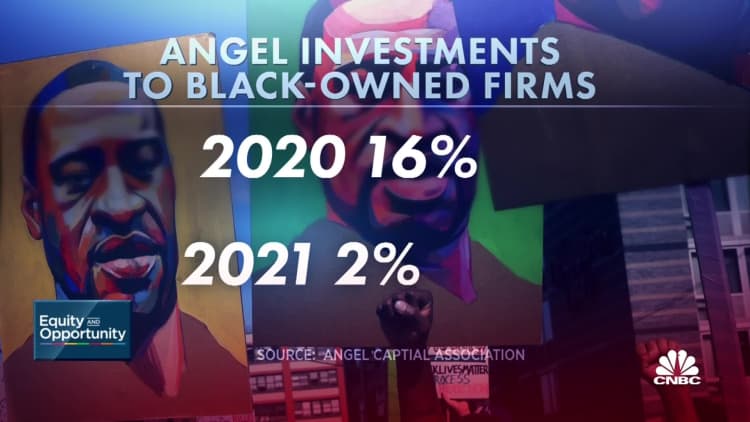
Morsa Images | Getty Images
Inflation has given millions of people new access to certain investments earmarked for the wealthy — and consumer advocates argue that’s not a good thing.
Americans must generally be “accredited” to invest in private companies and investments such as private equity and hedge funds.
That accredited status is a consumer protection issue: To qualify, households must meet certain requirements — like a minimum net worth or annual income — which helps ensure they’re financially sophisticated and can sustain the risk of loss from private investments.
Over 24 million U.S. households — about 18.5% of them — qualified as accredited investors in 2022, the Securities and Exchange Commission said in a report issued Friday.
That’s an increase of about 8 million households from 2019, the last year for which the SEC published an estimate. That year, 13% of households qualified.
The increase is “largely due to” inflation, the SEC said.
How inflation affects accredited investor ranks
Individuals can generally become accredited by having a $200,000 annual earned income, or $300,000 for married couples. Individuals or couples can also qualify with a total $1 million net worth, not including the value of their primary residence.
However, those financial thresholds aren’t pegged to inflation. They stay the same even as wealth and incomes naturally grow over time — meaning more people have gradually become accredited over the years.
Indeed, the thresholds haven’t changed since their creation in the early 1980s. In 1983, just 1.5 million households — 1.8% — qualified as accredited investors, according to SEC data.

Most Americans will join the ranks of accredited investors in coming decades if the financial thresholds remain unmoored from inflation: By 2052, nearly 119 million households would qualify — or about 66% of them, the SEC said.
“The pool keeps increasing,” said Micah Hauptman, director of investor protection at the Consumer Federation of America, a consumer advocacy group. “If we don’t do anything, the standard will be rendered meaningless.”
If the financial standards had been indexed to inflation since the 1980s, a married household would need a roughly $3 million net worth or a $911,352 joint income to be accredited in 2022, the SEC said. Just 5.7% of households — about 7.4 million — would qualify, according to its data.
More from Personal Finance:
Even high earners consider themselves ‘not rich yet,’ despite their net worth
The S&P 500 is up about 23% year to date. Here’s what to know
Only 60% of student loan borrowers made payments when bills restarted
The difference between public and private investments
Private investments differ from their publicly available counterparts.
Public investments include ones with which most households are familiar, such as the stocks and funds available for purchase on a stock exchange. Generally, anyone can buy them.
Private investments let people invest in companies that aren’t listed on a public exchange.
Some argue that private investments should be available to a broader pool of investors due to benefits such as higher average returns.
Private equity returns, for example, have outperformed the S&P 500 stock index by 1% to 5% on an annualized basis since 2009, according to a 2021 report by Michael Cembalest, chair of market and investment strategy for J.P. Morgan Asset & Wealth Management.
Others argue that private markets are less transparent, with information about companies and funds less readily available to many investors, and carry additional risks.
“Without information, you have no ability to value the company to make an informed investment decision,” Hauptman said. “You’re investing blind.”
Private investments are also generally illiquid, and investors should be prepared to lock up their money for maybe 10 years in some cases, said Paul Auslander, a certified financial planner and director of financial planning at ProVise Management Group in Clearwater, Florida. That longer holding period could make them riskier for some investors, he said.
“It’s like any other investment,” Auslander said. “You have to read the fine print and make sure you know what you’re investing in.”
Shift away from pensions helps investors qualify
Aside from inflation, trends like the move toward 401(k) plans and away from pensions have contributed to the swelling ranks of accredited investors over time, according to the SEC.
About 85 million people actively participated in 401(k)-type plans in 2020, about three times the number in 1982, the SEC said. Such private retirement savings is included in calculations of net worth.
The pool keeps increasing. If we don’t do anything, the standard will be rendered meaningless.
Micah Hauptman
director of investor protection at the Consumer Federation of America
The shift from pensions may have also “created investor protection considerations” that weren’t present in the early 1980s, according to the SEC. That’s because the responsibility for investment decision-making shifts from employers to individuals, who may lack the experience to appropriately manage investment risk, the SEC said.
There would be about 5 million fewer accredited investors in 2022 if retirement savings were omitted from the net-worth calculation, the SEC said.







